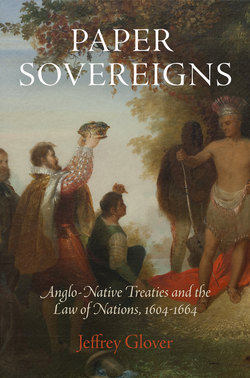Paper Sovereigns

Реклама. ООО «ЛитРес», ИНН: 7719571260.
Оглавление
Jeffrey Glover. Paper Sovereigns
Отрывок из книги
Paper Sovereigns
Anglo-Native Treaties and the
.....
The story I tell in this book spans several decades. It begins with the settlement of Virginia in the wake of the Treaty of London (1604), and concludes with the English crown’s direct assertion of authority over New England Indians in 1664, an event that led most English colonists to abandon the transatlantic publication of Native treaties. In the window of time between these two events, settlers frequently publicized treaties with Native peoples to show their possession of territory (and sometimes waters). Many scholarly accounts have viewed these treaties as documents of barbarism—not the kind of barbarism the English projected onto Native Americans, but the kind we now associate with those who violate human rights. This much is true. But this way of looking at things can conceal the many agendas that converged on treaties or later found expression in them. Native treaties were part of a centuries-long attempted genocide, but neither Europeans nor Native people knew what the future would hold. It is this uncertainty—about what treaties meant, about whether they would be broken, and about who would triumph if they were—that I take as my starting point.
According to Smith, ambush is universal in Virginia. Americans are virtually built for surprise attack. “They are very strong, of an able body and full of agilitie,” he writes, “able to endure to lie in the woods under a tree by the fire, in the worst of winter, or in the weedes and grasse, in Ambuscado in the Sommer.”71 Ambushing is not only part of war, however. It is also a tactic Powhatan uses to surprise ostensible allies at treaty negotiations. Smith relates a cautionary tale of Powhatan’s willingness to launch surprise attacks against friends: “In the yeare 1608, [Powhatan] surprised the people of Payankatank his neare neighbours and subjects. The occasion was to us unknowne, but the manner was thus. First he sent diverse of his men as to lodge amongst them that night, then the Ambuscadoes invironed al their houses, & at the houre appointed, they all fell to the spoile, 24 men they slewe.” These are not the kindly Indians described by Archer. They visit Payankatank on a diplomatic errand, yet when night falls, Powhatan takes advantage of his hosts’ hospitality to slay them and take their land. At his next parley with the English, Powhatan brandishes his grisly spoils to gain an advantage at the bargaining table. “The lockes of haire with their skinnes he hanged on a line unto two trees,” Smith writes. “And thus he made ostentation of as great a triumph at Werowocomoco, shewing them to the E[n] glish men that then came unto him at his appointment, they expecting provision, he to betray them, supposed to halfe counquer them by this spectacle.”72 Collecting scalps at one meeting, Powhatan brandishes them at the next, using his conquest of one neighbor to try and cow another into submission.
.....